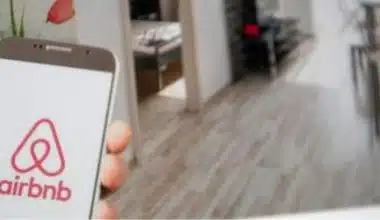Starting an Airbnb business can be a great way to earn extra income and be your own boss. With a little planning and effort, you can create a successful Airbnb business that provides guests with a unique and memorable experience.
In this blog post, we’ll walk you through the steps of how to start an Airbnb business, including:
- Choosing the right property
- Setting up your Airbnb listing
- Pricing your listing
- Marketing your listing
- Managing guests
By following these steps, you can start an Airbnb business that is profitable and enjoyable.
How To Start An Airbnb Business
Starting an Airbnb business is a process of creating and managing a business that involves renting out properties or rooms on the Airbnb platform. It includes the steps, strategies, and considerations necessary to establish and run a profitable and successful short-term rental business using Airbnb. Starting an Airbnb business can be a rewarding venture, both personally and financially.
Steps On How To Start An Airbnb Business
#1. Research Local Laws and Regulations
To start an Airbnb business, research local laws and regulations for short-term rentals. Many cities require permits and licenses, while homeowner associations may have their own rules. Consulting a lawyer can ensure compliance with all legal requirements, including those of homeowner associations.
#2. Obtain Permission and Check Lease Agreement
If you are renting the property, obtain permission from your landlord, co-op board, or homeowners association, if applicable. Review your lease agreement to check if there are any provisions about subletting or short-term rentals. Some homeowners associations may have restrictions on renting your home on a short-term basis.
3. Choose a Desirable Real Estate Market
Selecting a property in a desirable real estate market is essential for a successful Airbnb business. Consider cities or areas near popular tourist destinations, such as beaches, mountains, landmarks, or festivals that attract visitors year-round. A property in a high-demand location increases the likelihood of attracting guests and generating income.
#4. Assess the Market and Competition
Before listing your property on Airbnb, assess the market and competition. Research other listings in your area that are similar to your space. Take note of what they offer and identify any gaps or opportunities where you can provide a unique experience for guests.
#5. Prepare Your Property
To ensure a positive guest experience, prepare your property before listing it on Airbnb. This includes keeping up with maintenance, ensuring the property is clean and well-prepared for guests, and organizing your business finances for tax purposes.
#6. Create a Listing on Airbnb
Once your property is ready, you can create a listing on Airbnb. Provide detailed and accurate information about your property, including attractive photos and a compelling description. Set your price for the listing, taking into account factors such as location, amenities, and market demand.
#7. Enhance Your Property
To attract guests and stand out from the competition, consider enhancing your property. This can include upgrading amenities such as comfortable furniture, high-quality bedding, and modern appliances. Adding unique touches like local artwork, plants, or personalized welcome notes can also create a memorable experience for guests.
#8. Set Competitive Pricing
Pricing your Airbnb listing appropriately is essential. Research the market and analyze similar listings to determine a competitive price. Take into account factors like location, amenities, and guest demand. You can also consider offering discounts for longer stays or special promotions during off-peak seasons to attract more bookings.
#9. Market Your Listing
Marketing is key to attracting guests to your Airbnb listing. Utilize professional photos that showcase the unique features of your property. Write a compelling and detailed description that highlights the benefits and amenities.
#10. Provide Exceptional Customer Service
Delivering exceptional customer service is essential for building a good reputation on Airbnb. Be responsive to guest inquiries and messages, and provide clear and detailed instructions for check-in and check-out procedures.
How To Start Airbnb Business Without Owning Property
Starting an Airbnb business without owning property is indeed possible. You can make money on Airbnb without owning a property.
Here are some ways to start an Airbnb business without owning property:
#1. Subleasing
Subleasing is a popular strategy that allows you to rent a property from someone else and then list it on Airbnb. You act as the middleman between the property owner and the guests, handling the management and operations of the rental.
#2. Co-Hosting
Co-hosting involves partnering with an existing Airbnb host and assisting them with managing their property. As a co-host, you can handle tasks such as guest communication, check-ins, cleanings, and maintenance. In return, you receive a percentage of the rental income. This allows you to earn money from Airbnb without owning a property.
#3. Vacation Rental Consulting
If you have expertise in the vacation rental industry, you can offer consulting services to property owners who want to list their properties on Airbnb. You can guide pricing, property setup, marketing strategies, and guest experience.
#4. Property Management
Property management involves managing and overseeing multiple Airbnb properties on behalf of property owners. You can handle tasks such as guest communication, bookings, cleaning, and maintenance. By building a portfolio of properties under your management, you can earn income without the need for property ownership.
#5. Renting Properties on a Long-term Basis
You can approach property owners who are willing to rent out their properties on a long-term basis and negotiate a sublet agreement. Once you have secured the property, you can list it on Airbnb as a short-term rental.
#6. Lease Arbitrage
Lease arbitrage involves signing a long-term lease with a property owner and then subleasing the property on Airbnb for short-term stays. The goal is to generate more income from the short-term rentals than the cost of the long-term lease.
Property syndication involves pooling resources with other investors to collectively purchase a property and then rent it out as an Airbnb. Each investor contributes a portion of the investment, and profits are shared accordingly. This allows you to benefit from the income generated by the property without bearing the entire financial burden alone.
#8. Master Leasing
Master leasing involves leasing an entire property from the owner and then subleasing it to multiple guests on Airbnb. This can be a viable option if the property owner is open to the idea and complies with local regulations.
#9. Home Staging and Management
Some homeowners may have vacant properties or second homes that they are not using. You can approach them and offer to stage and manage their property as an Airbnb rental. This can involve furnishing and decorating the property, handling guest bookings and communication, and managing the day-to-day operations. In return, you receive a percentage of the rental income.
#10. Partnership with Local Businesses
Consider partnering with local businesses, such as boutique hotels or bed and breakfast establishments, to list their rooms or properties on Airbnb. This can be a win-win situation as the businesses benefit from additional bookings, and you earn a commission or fee for managing the Airbnb aspect of their business.
How To Start An Airbnb Business With No Money
Starting an Airbnb business with no money may seem challenging, but it is possible. It requires effort, time, and investment. You need to research and understand the rules and laws governing rental services in your locality before you start making money from Airbnb.
#1. Offer Your Space for Home Exchange
Consider participating in home exchange programs where you offer your space in exchange for accommodations in another location. Platforms like HomeExchange and Love Home Swap facilitate these arrangements. This can allow you to travel and explore new places while listing your own space on Airbnb.
Negotiate with property owners to rent or lease their space with a revenue share agreement. In this arrangement, you pay a portion of the rental income to the property owner in exchange for using their property as an Airbnb listing. This allows you to start the business without upfront costs.
#3. Utilize Rent-to-Own or Lease-to-Own Options
Explore rent-to-own or lease-to-own options where you can negotiate with property owners to rent their property with the option to buy it in the future. This allows you to generate income from Airbnb rentals while working towards owning the property in the long run.
#4. Offer Property Management Services
Provide property management services to existing Airbnb hosts who require assistance with guest communication, cleaning, maintenance, and other tasks. By offering reliable and professional services, you can earn income without requiring your property.
#5. Collaborate with Local Businesses or Hostels
Partner with local businesses or hostels that have spare rooms or properties. Offer to manage their Airbnb listings and handle guest bookings and operations. In return, you can negotiate a percentage of the rental income as your fee.
#6. Seek Out Investors or Partnerships
If you have a strong business plan and a compelling vision, you can pitch your Airbnb business idea to potential investors or partners who can provide the necessary funds to get started. This may involve sharing equity or profits, but it can help you launch your business with limited personal investment.
#7. Utilize Peer-to-Peer Lending Platforms
Explore peer-to-peer lending platforms like Prosper or LendingClub to borrow money for starting your Airbnb business. These platforms connect borrowers with individual lenders who may be willing to fund your venture.
#8. Start a Side Hustle
If you don’t have the funds to invest in a property, consider starting a side hustle to build your savings. Once you have saved enough, you can invest in a property suitable for Airbnb rentals.
#9. Offer Services to Airbnb Hosts
Consider offering services to Airbnb hosts, such as professional photography, copywriting, cleaning, or maintenance. These services can help hosts improve their listings and guest experiences, and you can earn income by providing these services.
#10. Subletting or Renting Out Unused Space
If you have extra space in your own home, such as a spare room or a basement, you can consider subletting or renting it out on Airbnb. This allows you to generate income without the need for a separate property.
How Do I Start My First Airbnb?
Starting an Airbnb requires assessing your market, finding a space to rent, preparing and furnishing your space, creating an Airbnb listing, setting your price, and marketing your space. It’s essential to research and understand local rental service rules and laws before starting. Create a unique guest experience and promote your listing on social media, blogs, and other platforms. Consider offering Airbnb experiences, hyper-local activities, and knowledgeable hosts to hook up guests with knowledgeable hosts. Remember to pay attention to utility bills, cleaning services, and compensation for co-hosts if needed.
How Much Money Do You Need To Make An Airbnb?
The amount of money needed to start an Airbnb business can vary based on factors such as location, property type, and personal preferences. On average, the cost to start an Airbnb business is estimated to be between $3,000 and $6,000. It’s important to consider expenses and conduct thorough research to determine the specific financial requirements for your Airbnb business.
Is Starting An Airbnb Profitable?
Starting an Airbnb business can be profitable, but the level of profitability varies based on factors such as location, market demand, pricing, occupancy rate, and expenses. It’s important to consider expenses and carefully analyze the market to determine the potential profitability of your specific Airbnb business.
How Do Airbnb Owners Make Money?
Airbnb owners make money by renting out their properties, offering additional services, co-hosting, providing property management services, and hosting experiences and activities. They can set their prices and earn income from bookings, while also considering expenses and the service fee charged by Airbnb. The amount of money earned varies based on factors such as location, property type, pricing, occupancy rate, and the quality of services provided.
How Much Do Airbnb Owners Make?
The earnings of Airbnb owners depend on the location, property type, pricing, occupancy rate, and the quality of services provided. The average annual earnings in the United States range from $9,000 to $44,235, and hosts make an average of $99 per night for a private room and $242 per night for a unit with up to 4 guests.
How Much Can I Earn On Airbnb?
The amount of money you can earn on Airbnb varies depending on factors such as location, property type, pricing, occupancy rate, and the quality of services provided. Airbnb provides tools and calculators to estimate potential earnings, but it’s important to budget for operating expenses. On average, Airbnb hosts in the United States earn around $9,000 per year, but earnings can vary significantly. Additional services, co-hosting, property management, and hosting experiences can also contribute to earnings. Individual circumstances and market conditions play a role in determining actual income.
Conclusion
Starting an Airbnb business without owning a property can be done through various strategies, and these strategies allow you to manage property operations, offer vacation rental consulting, manage multiple properties, and other pertinent features. It requires effort, time, and investment. To start, consider participating in home exchange programs, renting or leasing with a revenue share agreement, using rent-to-own or lease-to-own options, offering property management services, collaborating with local businesses or hostels, seeking investors or partnerships, using peer-to-peer lending platforms, or starting a side hustle to build savings for property investment. Research local rental laws and regulations before starting your Airbnb business.
- BEST GAMES TO PLAY ON A ROAD TRIP
- HOW TO BE AN AIRBNB HOST: Detailed Guide
- HOW OLD DO YOU HAVE TO BE TO RENT AN AIRBNB?
- HOW TO LIST ON AIRBNB: The Ultimate Guide
- IS AIRBNB SAFE? All You Need To Know






